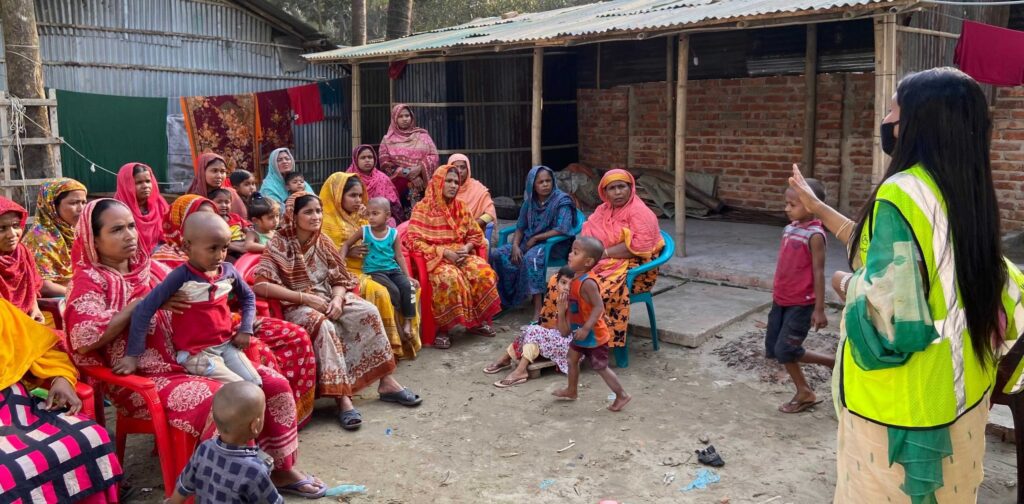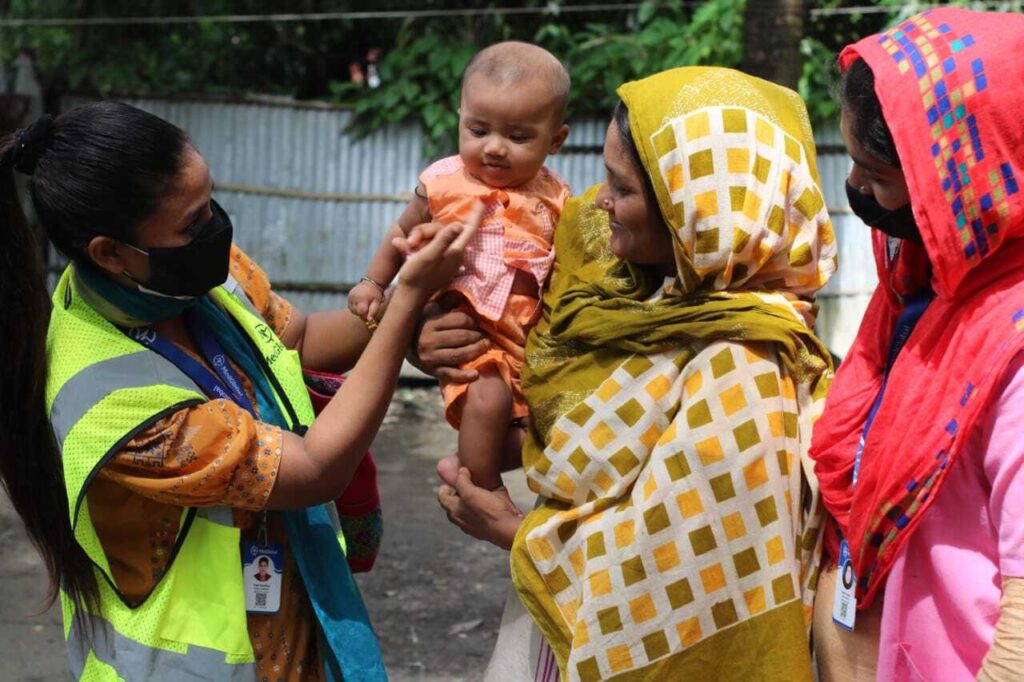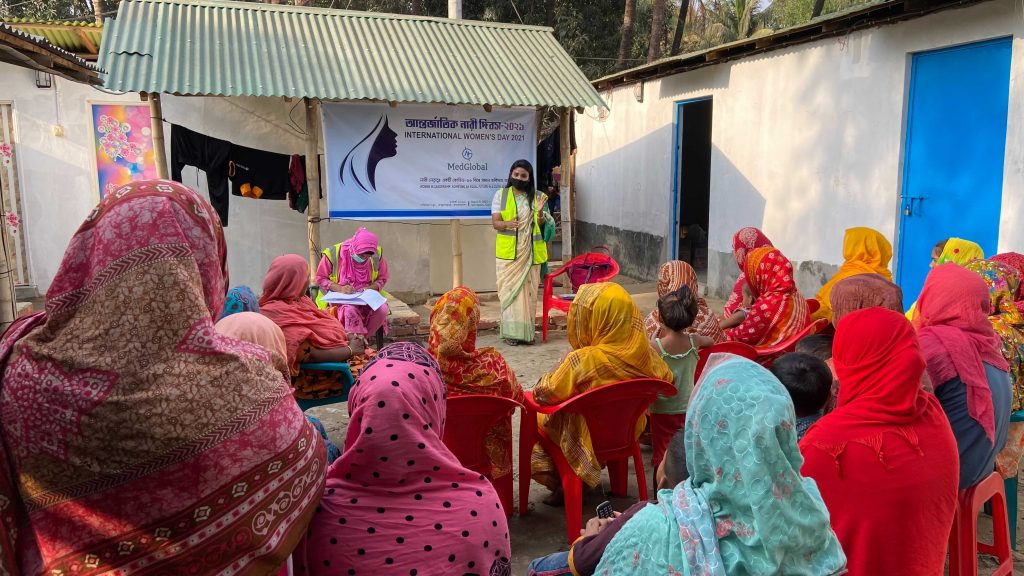Updates & Press
Featured | August 9, 2021
Maternal Health in Cox’s Bazar: The Impact of Mo
Author | MedGlobalComms

By Emma Ackerman, MedGlobal Communications & Advocacy Intern
Last June in the Somitipara neighborhood of Cox’s Bazar, 20 year old Nazia* died in her home after enduring four days of severe labor pain during her first pregnancy. Her family was one of many unable to pay for transportation to a hospital or services of a skilled birth attendant.
The Somitipara neighborhood of Cox’s Bazar, also known as “Kutubdiapara,” is inhabited by an estimated 40,000 Bangladeshi internally displaced people (IDPs). Most residents are illiterate and live in extreme poverty, relying largely on the dry fishing business and rickshaw pulling for income. With an average daily income of an estimated $5.90 USD, the vast majority of residents are unable to afford even the most basic necessities- including medical care and adequate nutrition. Despite being located only 4.8 km (2.9 miles) outside of Cox’s Bazar proper, few health facilities or community health workers are available in the Somitipara neighborhood. Only 0.2 nurses and 0.5 doctors are available for every 1,000 Bangladeshi residents. Most people can’t afford medical expenses or even transportation to the few existing facilities.
Women of reproductive age, particularly pregnant mothers, and newborns are disproportionately impacted by the lack of available health care and education. Poverty has created heartbreaking conditions and exacerbated health risks for women of Cox’s Bazar. A recent Bangladesh Demographic and Health Survey found that 90% of women go through labor in their own homes and 36% do so without the services of a trained health worker or midwife. Impoverished families often feel pressure to marry their daughters early in order to improve their economic situation. According to data collected by the Local Counselor office in Somitipara, on average girls are married by the time they reach 15. Child marriage increases chances for complications or even death during delivery for mothers and newborns. For Bangladeshi women ages 15-49, maternal mortality is the third leading cause of death. Three hundred women out of 100,000 die giving birth in Somitipara- a maternal mortality rate that is 44% higher than the national average of Bangladesh.
MedGlobal has worked in Cox’s Bazar since 2017, as part of our overall mission to reduce health disparities. In February 2021, MedGlobal established a Maternity & Birthing Center in order to increase access to free maternity, birthing, and neonatal services in the underserved community of Somitipara, Cox’s Bazar. Part of the Maternity & Birthing Center operations includes facilitating Mother’s Club sessions for new and expectant mothers over 16 years old. These Mother’s Clubs educate women and girls in the catchment area of the Maternity & Birthing Center on sexual and reproductive health (SRH) and encourage them to seek antenatal care and facility-based delivery. Topics of Mother’s Clubs sessions include:
- Hand washing
- Family planning and pre-birth planning
- Period danger signs during pregnancy
- Pregnant mothers’ activity
- Nutrition during pregnancy
- Pregnant mothers’ health care
- MedGlobal Maternity & Birthing Center’s services
- Deciding roles and responsibilities of family members during pregnancy
- Menstrual hygiene
- Awareness of child marriage issues

Since the opening of the Maternity & Birthing Center on March 1, 2021, MedGlobal’s maternity team has formed 15 Mother’s Clubs, each with approximately 15-20 members. Each club meets at least twice a month for 20-25 minute sessions. So far, nearly 60 sessions have been held across Somitipara. The clubs are coordinated by a President and a Secretary, both of which are community members. Doctors and midwives of MedGlobal’s Maternity & Birthing Center present the health education materials during meetings and encourage open communication and connection among each club’s members.

Establishment and implementation of the Mother’s Clubs have not always been smooth sailing. MedGlobal staff members have faced numerous challenges throughout the implementation process. Some of the challenges include stigmas & superstition that can impact care seeking behavior, family pressure, and shyness. Project Coordinator Kazi Morjina feels that community engagement is the avenue to overcoming these challenges and is the most impactful aspect of the Mother’s Clubs.
“Community women know our midwives and midwife assistants. Community mothers like our team members. By gaining trust and giving the best 24/7 quality services and disseminating our service related information whenever community mothers come to seek healthcare services, community mothers can get sustainable care in the long-term.”
-Kazi Morjina
MedGlobal’s Mother’s Clubs aim to impact the long-term health of Somitipara neighborhood residents. According to Kazi Morjina, community members previously unable to access health care and unaware of MedGlobal services are now actively seeking out facility-based health services and spreading community awareness. When asked about the power of these Mother’s Clubs, Kazi Morjina shared the inspiring story of Noor*:
“She is very poor. Her husband left her when she conceived their third child. She has no family. She stays here at Somitipara alone with her two children. When our Mother’s Club reached Somitipara, she willingly came to be a regular member. She got to know about our services and she became our patient. She is happy to have us because she has no one else beside her. Our midwives gave her the confidence that they would be with her until her delivery. She kept trust in our team and gave birth to a baby girl at midnight at our Maternity & Birthing Center in July. Our whole team supported her as much as her family.”
-Kazi Morjina
Increasing reproductive health education and awareness through programs like these Mother’s Clubs is vital for improving the long-term health for pregnant women, new mothers, and future generations of Cox’s Bazar.
*names changed for anonymity


